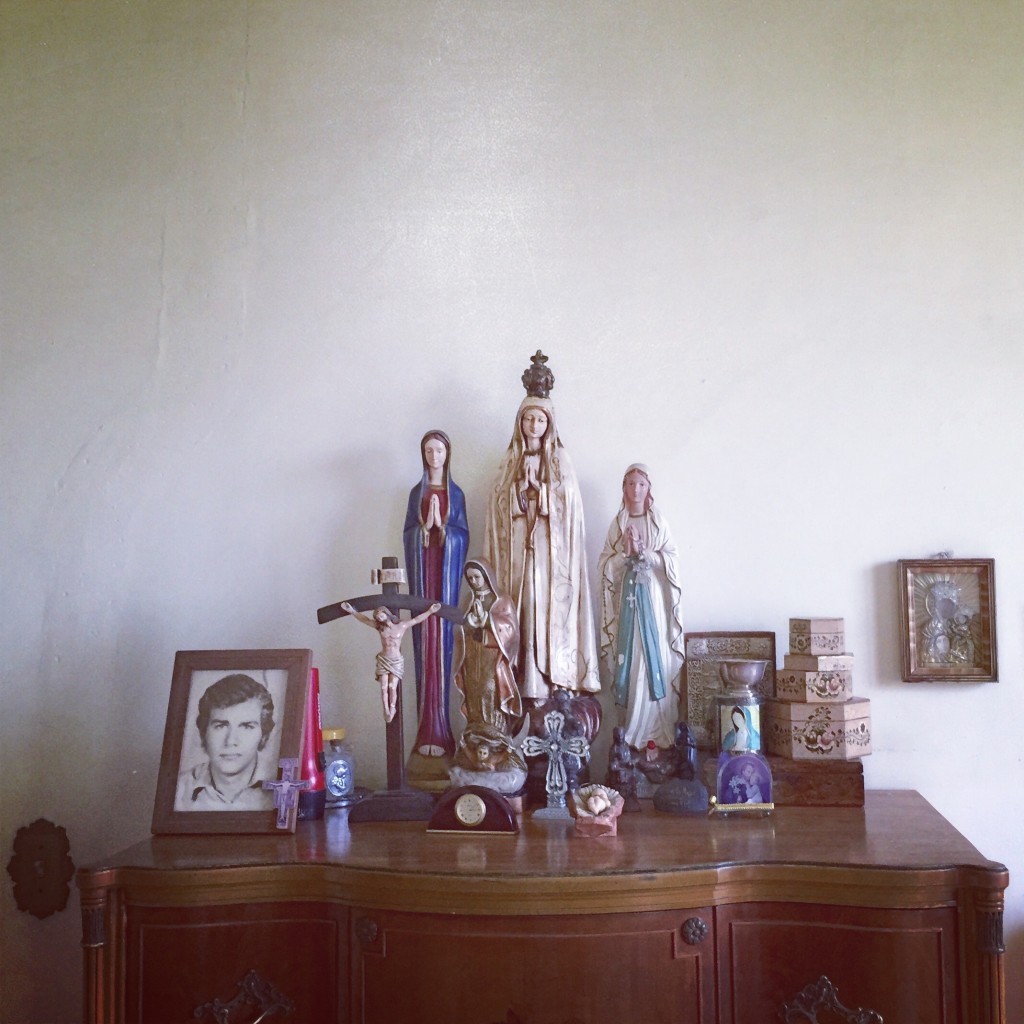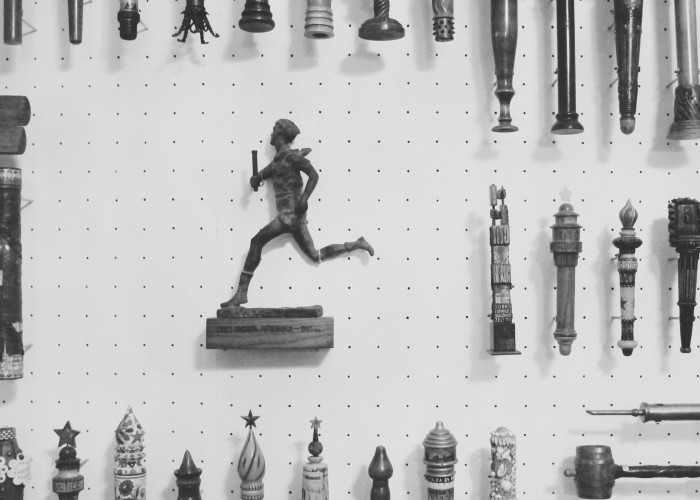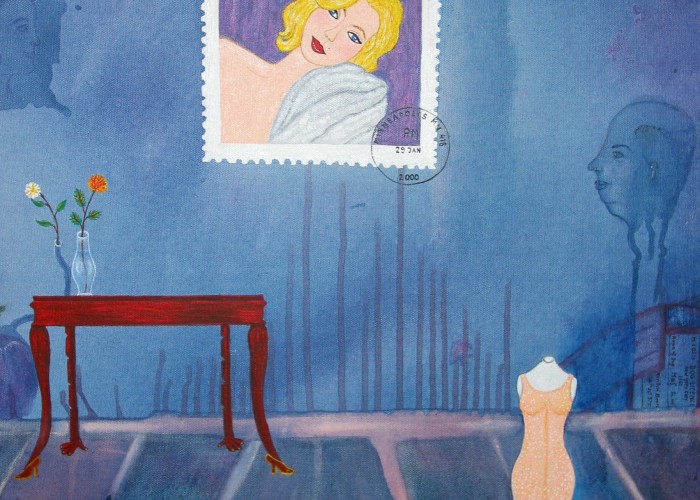Islands
Gabriela Poma
The sleeping pills had finally worn off.
Her left eye opened, a slit, and she remembered to breathe.
Yo no entiendo nada de esto.
The world seemed on its side, wrong, as she viewed it then. Everything around her was new and nothing really belonged to her and, yet, she had to make it all familiar.
She scanned the room—
a recliner next to the window, the television still on, the armoire, two lamps, the ordinary bedding, the awful green carpet, the silver-streaked wallpaper with silhouettes of sleek bamboo shafts.
She had taken an inventory of all the things in the bedroom and repeated the order back to herself over and over again. Then, she noticed her rings scattered like rolled dice on one of the bedside tables. It was all there they way she’d left it the night before.
Her eyes finally settled on particles of dust slowly descending from the curtain rails, glistening in the sunlight.
How to face the day, this first day of a new life.
She kept the weekend bag next to the bed, just as she’d kept it next to their bed back home. It was packed with a change of clothes, a shawl, a bottle of Fidji, some toiletries, the essentials. It reminded her of the place she’d just left, where she’d waited for news of his release, ready with that bag to leave in an instant, to get him to safety, to nurse him back to health, so that life could continue to be as it was meant to be.
But this was the first day of a new life, and she was alone in a strange place, Florida, with two small children.
She thought of the last note her father-in-law had received from him, and which she had memorized, dated January 25.
Querido papá,
La letra me sale bastante mal porque tengo la mano dormida. Como deseo
que esta nota te llegue hoy la haré breve. He recibido muy buen trato aunque ya
deseo estar en casa. Espero que todas las negociaciones vayan viento en popa.
Abrazos cariñosos para todos y para Lucía y mis hijos mil besos.
Roberto
She remembered to breathe again and lifted herself up from the crisp, foreign bedding that held her. She decided to begin.
They kept saying that he had left a wife and two children, a boy and a girl, and oh, what a pity! So young and full of promise. What would become of them now?
They would spend their lives looking for a reference.
There was that photograph taken by the press, of the young wife leading her children down the front steps of their house to an idling car. She was pony-tailed and wearing that navy blouse with the pointed collar, a long denim skirt, tall wedges on her manicured feet, no sleep, no make-up, so young, still beautiful, looking down.
The children, too, were looking down, their heads heavy with their honeyed hair, straw- like, just like their mother, in a stupor, eyes creased because of the sun.
Everything in that photograph is pointing down: the eyes, the hair, the mouths, their shoulders, their silence, their hearts closing up slowly, and then tight. Tightly shut and as if recoiled, sealed.
Leave them alone.
Leave them alone forever, the image seems to say.
Their mother smoked long cigarettes.
She’d stare out through the wall of the kitchen into the den, into the dining room, into her bedroom, between the hallway bookshelves, into the bathroom next to the children’s bedrooms, through the window and out into the yard, through the hibiscus bushes, the fence, the neighbor’s pool, around the chimney on the neighbor’s roof and into the vast, open sky.
She’d stare into her thoughts with her large wintry eyes, in silence, one leg crossing the other, kicking out, moving the stale air in the kitchen of their new home, far from the initial apartment where they’d first landed, this constant ticking of impatience and fear, with her feet marking time.
She still waited for something to change, for a phone call, for an end to all of this, for some repose, for permission to go home to the way things were, for a reservation to be made, for a winning number, for the magic wand.
For someone to take care of it!
Y quién soy ahora?
Was she a widow, a wife? In her mind, she was still married.
The three of them sat around the wooden dining table, eating slowly and in morsels, speaking fragments of sentences, the girl usually silent, the boy nurturing a nascent violence.
Steam would rise up from the teakettle, like the fog in Panchimalco, where they had played and looked for each other as part of a game, pretending to be lost.
To distract themselves, while they waited for news of their father, they would leave San Salvador and go to La Libertad.
At night, the garden by the sea would be full of fireflies.
The children would chase and catch the fireflies with gentle claps and place them in old glass jars with holes on their tin tops. They would try to read by the light of the makeshift lamps, then tell each other made-up stories as the light of dying insects began to fade.
The ocean air was thick with salt and stung their eyes, the salt crusting on their cheeks and arms. The children would make their way to the pool, peeling the paper-like bark of the jiote trees, carefully stepping over any dormant ant hills.
There they stood, together, having reached the best-lit section of the grounds, and they’d let themselves glow beneath the moon and splashes of stars.
The toads suddenly croaked and, fittingly, the children feared their milky poison.
The ocean was strange, what it provoked.
They were easily confused by so much mystery, and they longed for morning, when they thought they had seen him again there, appearing in the thorny patches of grass and amidst the plague of butterflies, or there!
diving
into the stillness of the pool,
or
lying in a hammock,
reading thick books.
They were always going away, the mother and the children, to wait for him somewhere else.
Or so it seemed.
To visit her relatives in Managua.
To a farm for a couple of days.
To a friend’s house in Panchimalco for the weekend, the children playing in the thick fog that rolled from the sides of the volcano, in slow,
deep
breaths.
And then, one day, they went away for good.
Their mother got help to pack everything in the house they had rented while their father was still alive.
They gave their dog away and sent their cuyo to the local zoo. Doors shut, the pool was drained, the curtains drawn, key chains rattled and locks bolted, books were taken down from shelves and put in labeled boxes, their father’s clothing was distributed among various charities.
Certain things were kept and stored in a room: the sports jerseys and the polo mallets, old love letters to their mother carefully separated into tidy bundles tied with ribbons and folded neatly into plastic bags, photographs and trophies, school notebooks with his early penmanship, his shoes, the architectural renderings of the house they had planned to build, a California ranch-style house with bedrooms for more children and a great clearing.
The house would have been next to his brother’s, on a quiet, dimly-lit hill that, at night, rolls towards the bright lights of the sprawling city.
When she wasn’t being quiet, the girl wrote poetry. Innocent haikus about birds in flight and hot-air balloons over faraway prairies.
Always about leaving.
She wrote a short story about time travel that won first prize at the local fair.
Did anyone notice?
How could it be that this child felt so young and so old at once?
And how was it that, when she stood still, she felt the totality of her small life envelop her. The weight of it would wear out her tiny bones, her side would ache with longing, even her ribcage felt the inadequacy of her breathing,
as if it were detached from the rest of her body,
as if it had a life of its own.
While their father was still alive, they escaped the city every weekend and drove west on a narrow, trafficked road that emptied as it widened out and approached the coast.
The road would be level, then suddenly point up, wrapping itself around orange-colored hills that had been carved out of mountains to create these paths- dangerously slim corridors running through a fusion of bare trees and lifeless shrub.
Eventually, their car sped by the Cristo Negro shrine where piles of rocks lay roadside, accumulating from continual landslides during the rainy seasons, and the children eased into their seats as if finishing a rollercoaster ride.
Their father whistled while the radio station went in and out of frequency and he would steer with his knees, no hands, as he popped a piece of gum into his mouth, or rustled his hair with his fingertips, or caressed her kneecap. He drove through the port town of La Libertad and stopped at a cooperative where their mother bought fresh oysters, a bag of peeled green mango in salted lime juice, lottery tickets, water wings, honey-flavored candy and a homemade kite.
As they traveled over cement bridges, the same river flowed below, dotted with women washing clothes. Their long, shiny, black hair appeared like mirrors within mirrors, as they turned their heads against the reflecting water. The women’s arms pushed and pulled in swift strokes on the peaked surface of rocks, the scent of musk and moss and earth collecting under pavement, revealing a beguiling other world scooped out for the children to witness, always the same, reliable, beneath the bridges.
First, they lived in a building in the downtown section of Miami. The building was one of four, building B. The others were known as A, C and D- each letter corresponding to the name of an island. Building B, Barbados, became their temporary home, so they thought- a transitional respite meant to soothe them and tend their grief while they waited for a signal to return home.
In the meantime, the children organized parties in a room in the building’s lobby, adult-like parties with bags of ice and extra-large paper cups, strobe lights and slow dancing in the dark. They stole lollipops or guava paste from the downstairs grocer and raced bicycles on a dusty track near the Lutheran church. They wrote foul words on the dirty windows of parked cars with their soft fingertips and pushed the emergency button in elevators to keep them from running. They made crank calls and thought about the many ways they could exit the building in case of a flood or hurricane.
They made friends.
Some days, they would go to the hairdresser’s with their mother to watch over her – a fort, no trespassing, a ring of fire around her and legions of angels. The hairdresser wore roller-skates and had a longhaired dog. Their mother laughed out loud at his whispered jokes, her legs crossing and ticking with anticipation, then coming apart as her mouth opened wide and her head tilted back. Then, her legs would entwine with a sigh, finishing up the laugh a significantly long time after the punch line had been muttered. Their mother surprised the children with her gestures and her laughter, so abrupt and unusual. Her jumping eyes looked here and there in quick spurts, agitated, becoming wet when they settled and emptying as they closed.
Water rushed and drained. The on and off of blowers reminded the children of flickering Christmas tree lights or of Stop! and Go!, Yes! and No!. The drone of the vacuum cleaner echoed through the smell of cigarette ash, coffee creamer, old magazines, dye and cut hair. The children liked all the activity, the buzzing around them: fast, busy, numbing.
Women there marveled at the color of their hair—that threaded gold of childhood. The women asked for coloring like theirs, coveting that glow, the deceptive youthfulness around their faces that, depending on the angle, began to show a fading and give away hints of another time.
The children would leave the hairdresser’s wiping down the fronts of their overalls, pleased at having fulfilled their obligation to keep watch over their mother while trying to erase the trail of strange desires that the place had elicited in them and that had left its imprint on their play clothes.
At night, in the apartment, the children prayed together, looking out the sliding glass door at the brightest star, which they pretended was their father. It was not only the brightest, but also the closest.
They shared a room and the sliding glass door led to a balcony overlooking Biscayne Bay, where they watched planes coming into the city or leaving it. At night, the airplanes looked like gliding stars slowly tracing an invisible line in the sky. During the day, the planes seemed to spray dissolving, white cotton in their wake, against the construction paper blue of midmorning, or the dull gray of some afternoons.
There was a certain hour of the day that the children didn’t care for because it reminded them of having boarded an airplane with their mother, in a rush.
Usually, the children were at school when that hour came, and if they weren’t, they would try to make themselves fall asleep then, unable to withstand the swaying inside that made them shudder. The girl’s fingers would curl into themselves while she rotated her hands together, as if washing them.
The late afternoon would come, then dusk, then night. And the children would be glad for it.
They prayed together before falling asleep. They got ready for bed, taking comfort in each other, in the verses they would swap, in the collective -Amen! – then the reverential nod forward. They would untuck the bedding from beneath the mattresses, peer inside their shared closet, under their beds. Before they turned the lights out, they made sure all the doors were locked, the one leading into their bedroom and the one leading out to the balcony, framing a swollen sky replete with stars and airplanes.
The boy usually woke up in the middle of the night, unable to fall asleep again unless the girl held him, rocked him, even if she didn’t sleep enough, even if, the following morning, she had trouble waking up.
Their mother was readying for a get-together at the apartment.
She stood in front of the marble-topped vanity in the master bath and placed her makeup bag out in front of her; the plastic covered one with tiny bouquets of purple flowers against a white backdrop. The vanity had a mirror that covered the entire wall above it, and the mirror had a straight line of large, round opaque light bulbs on its upper border, like a showgirl’s dressing room. Beneath the light bulbs and the mirror were two sinks; one was never used and at times collected a thin film of translucent dust.
Their mother brought out her brushes and did her eyes. She was wearing denim tailored pants, a stiff-collared safari style shirt and high-heeled shoes with tortoiseshell buckles at the tips. She slowly twirled the clasp of a necklace until it was secure, dabbed Fidji on her neck and arms, slid a small brush through her wavy, golden bob, ran her index finger along one thick eyebrow, then the other, took two steps back from the mirror for one last look, puckered her lips to enhance her cheekbones and walked into the living room, with its lacquered block tables, their father’s sculpture of a horse next to a lush fern and silver bowl filled with walnuts. At the opposite corner of the room, an étagère displayed a figurine of a golden hen and a cigar box, creating balance, drawing in the eye.
She methodically set out bottles and glasses on a bar cart alongside pale blue linen napkins embroidered with elephants, miniature ashtrays, a bucket of ice, wedges of lime. Her fingers then trailed across the records that she kept in an acrylic record holder, choosing one, putting it on, moving to the music, one wrist against the other, ready to clap, her eyes closed, her lips mouthing the words, “I love the night life, I’ve got to boogie…”
* *
Image: Gabriela Poma
[ + bar ]
Knocking on Keret’s Door
Masha Kisel
In Etgar Keret’s Suddenly, a Knock on the Door (2010), thirty-five humorously unexpected plots develop with the predictable timing of... Read More »
Thibault de Montaigu
Certains sans doute estimeront que cet ouvrage manque de rigueur et qu’on ne peut décemment rédiger une enquête criminelle en restant confortablement installé chez soi... Read More »
Mario Bellatin translated by Andrea Rosenberg
1- BLACK BALL RELOADED Author’s first look at the bande dessinée Black Ball
Yesterday I received some information about the Czech writer Bohumil Hrabal.... Read More »
Marilyn Monroe, my mother
Neda Miranda Blažević-Kreitzman translated by Ellen Elias-Bursac
Many people wrestle with discomfort and fear when they travel by air. Dino Lučić and Veljko Linić were... Read More »






 sending...
sending...